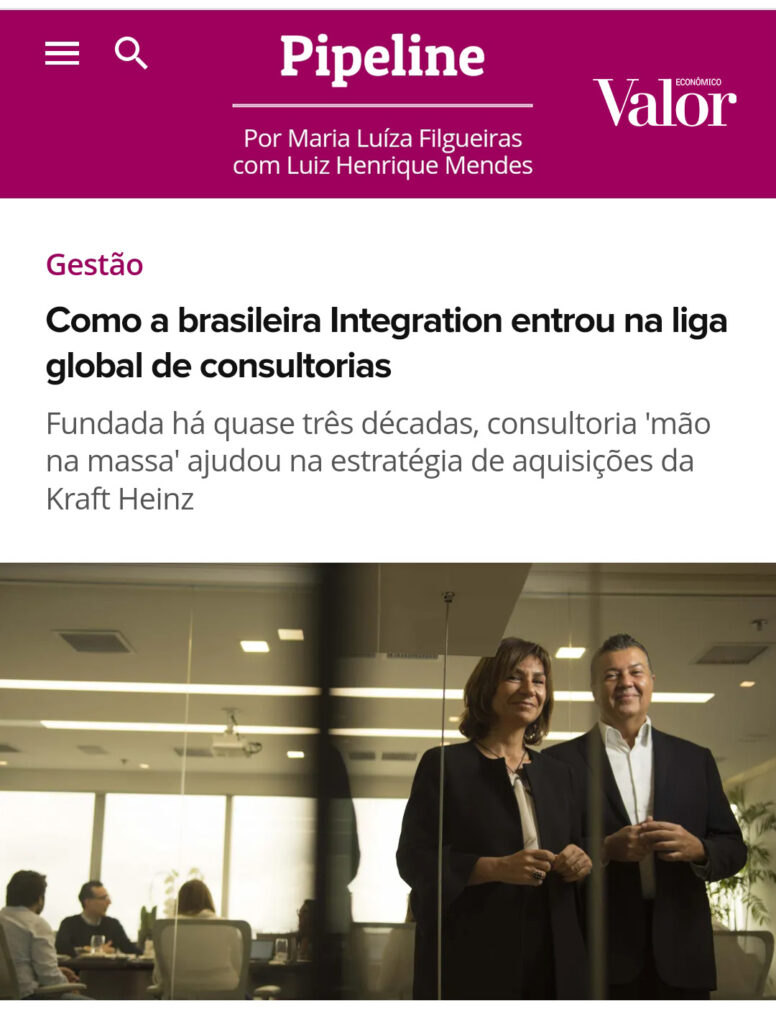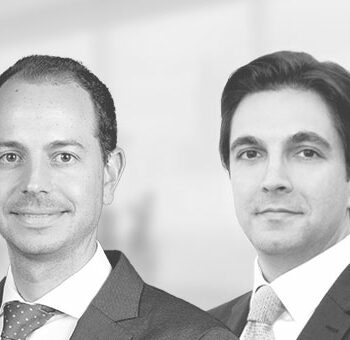
Making waves in the brazilian media
NEWS
Making waves in the brazilian media
Challenges & Success Stories
Integration Consulting woke up today featured in one of Brazil’s leading news publications related to business and economics.
After making Forbes’ list of top consultancy firms in the world, Pipeline Valor wrote an article sharing our history along with challenges and success stories we have experienced over the decades to arrive where we are today.
We’d like to share this achievement with all the professionals who have been part of our history, with all our clients who have provided us opportunities to present our work while placing their trust in Integration, and all our partners who have worked with us every day!
You can read the full article below:

How Brazil’s Integration entered the global consulting league
Founded nearly three decades ago, “hands-on” consulting helped Kraft Heinz’s acquisition strategy
By Luiz Henrique Mendes — São Paulo – 02/11/2022 10h00
When a group of Brazilians left Arthur Andersen — the embryo of what would become the technology giant Accenture — many thought that the idea of creating a world-class management consultancy from Brazil was crazy for these young novices. Without broadband or Google to compile data, Andrea Aun, Carlos Lima, Gilberto Sarian and Hugo de Almeida were faced with a David and Goliath situation. After all, how could one compete with firms like the giant created in the 1920s by James O. McKinsey – which owned a history of data constructed over decades?
Almost 30 years on, the Brazilian firm will close out 2022 as a brand with 860 client companies, spread over 75 countries. Today, 59% of sales are outside of Brazil, demonstrating that the big dream of being an international consultancy has become a reality – a rare case in the segment of intellectual capital services in the country. With revenue growth of 52% over the past five years, Integration has managed to circumvent the impact that the pandemic had on corporate demand.
With a team of 450 people and offices in cities such as London, Munich, San Francisco and Chicago, the company started to appear in global rankings. It is the only Brazilian company on a Forbes list of the 230 best consultancies in the world — a ranking that was prepared exclusively abroad following consultations with American, Japanese, British and French companies.
“At the time when we decided to create the consultancy, there was a monopoly on information. Mr. McKinsey had collected a lot of information and created a database that would sell at the price of gold. It was a big risk,” Lima recalls. In addition to McKinsey, the clear reference in management consulting, the quartet had to compete for clients with other heavyweights such as BCG and Bain.
To thrive with the new firm, they decided on an unusual approach at the time. Instead of just putting together recommendations, they would take a more hands-on approach to the projects developed for companies. “Participating in implementation was perceived very negatively by strategic consultancies, but we wanted a different model so as to not remain so far away from clients. I wanted to see the results,” Lima says. “Implementation is not something that happens overnight. It requires more time spent on the relationship with the client”, adds Aun.
While Integration’s idea was to start serving midsize companies, their first client surprised them: Exxon Mobil, which was the largest company in the world. The American oil firm faced a challenge: It wanted to bring its entire line of lubricants to Brazil but did not have a network of gas stations or another distribution channel of its own. “That was an MBA. I lost nine kilos throughout the project, but it worked,” Lima says.
Receiving the project with Exxon helped open doors. When Exxon’s CFO at the time migrated to Quaker, he hired Integration consultants to put together a strategy for the arrival of Gatorade in Brazil – an isotonic brand that belonged to the US company. Years later, the Brazilian consultancy also helped in a strategy to launch Unilever’s Ades soybean juice.
Over time, the Integration model took root. More recently, the consultancy has helped design and implement Kraft Heinz’s growth strategy, a plan that aims to quintuple the revenue of the international unit of the company – controlled by 3G Capital and Warren Buffet’s Berkshire Hathaway.
Kraft’s strategy included the acquisition of Hemmer in the state of Santa Catarina, a century-old ketchup brand founded by German immigrant Heinrich Hemmer. In addition to helping create the growth plan, Integration has also worked on the integration process between the companies – a challenge that is not always trivial with such different cultures at stake (making it no wonder why deals such as PepsiCo’s purchase of Mabel fell apart).
Good performance in Brazil encouraged Integration to internationalize. Though initially in Latin America, the leap came with their entry into the Old Continent. “Integration does global integrations. A few years ago, when P&G sold Wella to Coty, we worked with nearly 40 professionals spread across the globe,” Lima points out. Globally, the consultancy has grown from 2,300 project deliveries five years ago to 3,250 this year.
This text is a translation of the original content that can be shared using the link
- On 3 November 2022

